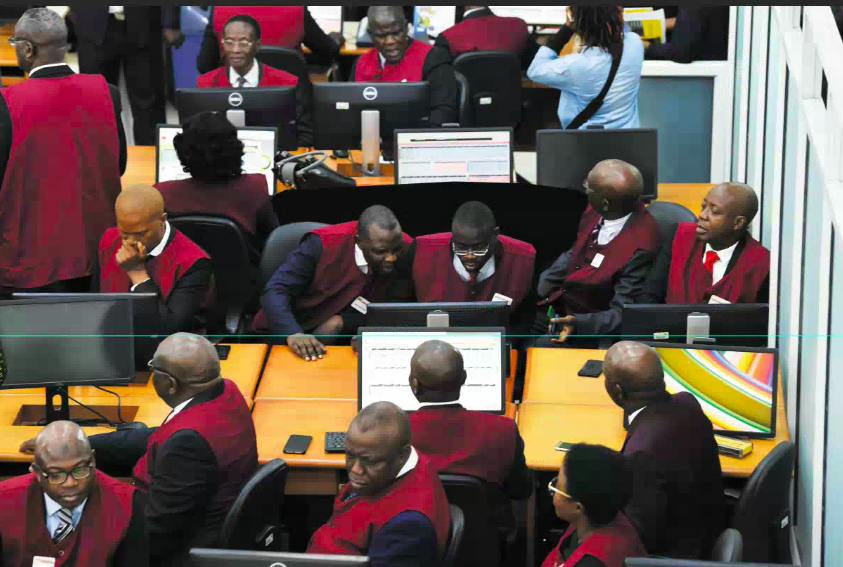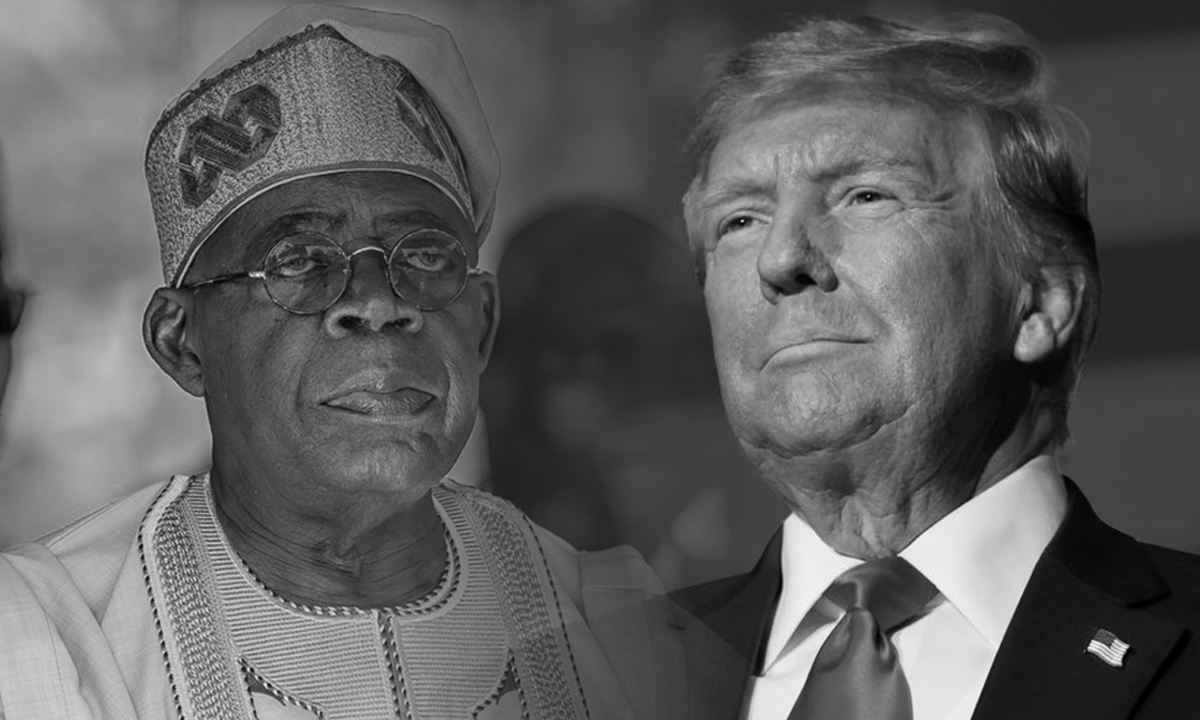*Says Nigeria in talks with US, WTO for mutually beneficial outcomes
*Okonjo-Iweala: tariff could shrink annual global trade, dampen growth prospects
*Ghanaian minister seeks to clear trade barriers among West African nations
James Emejo and Michael Olugbode in Abuja
Minister of Industry, Trade and Investment, Dr. Jumoke Oduwole, yesterday, hinted that the recent tariff announcements by the United States could potentially impact Nigeria’s $6 billion annual exports to that country going forward. Oduwole disclosed this in a position statement on the U.S. tariff measures.
Nigeria’s exports to the U.S. consistently stood between $5 billion and $6 billion annually over the last two years.
Specifically, the minister said while oil had long dominated Nigeria’s exports to the U.S., non-oil products previously exempt under the African Growth and Opportunity Act (AGOA), a U.S. trade law that provides eligible sub-Saharan African countries with duty-free access to the American market for over 1,800 products, “now face potential disruption”.
AGOA is aimed at boosting economic growth and promoting economic and political reform in the region.
Oduwole also pointed out that a new 10 per cent tariff on key categories of goods might affect the competitiveness of Nigerian goods in the U.S.
She stated, “For businesses in the non-oil sector, these measures present destabilising challenges to price competitiveness and market access, especially, in emerging and value-added sectors vital to our diversification agenda.”
According to the position paper, SMEs building their business models around AGOA exemptions will face the pressures of rising costs and uncertain buyer commitments.
However, the minister said the federal government remained actively engaged in consultations with its American counterparts and the World Trade Organisation (WTO) over evolving trade dynamics amid the recent tariff announcements by U.S. President Donald Trump.
She said the discussions were being carried out with pragmatism and a commitment to mutually beneficial solutions.
Oduwole said while the developments potentially impacted global trade negatively, Nigeria remained firmly committed to building economic resilience and accelerating export diversification under the President Bola Tinubu administration.
In the position statement on the U.S. tariff measures, Oduwole acknowledged the recent tariff measures announced by the U.S, including a 14 per cent tariff on Nigerian exports.
She stressed that the federal government considered the U.S. a valued trade and investment partner, bound by shared values and mutual economic interests.
The statement said the U.S. Ambassador’s visit to the Nigerian Minister of Industry, Trade and Investment on March 26, 2025, “reaffirmed our joint commitment to strengthening economic ties that benefit both economies.”
Oduwole stated that since May 2023, Tinubu had been actively committed to attracting and retaining the much-needed investments from “old and new friends of Nigeria”.
She pointed out that the federal government was currently implementing a range of policy interventions in financing, infrastructure, and diplomacy to help Nigerian businesses remain competitive amid regional and global tariff hikes.
She said government was committed to expanding alternative market access opportunities and ensuring off-take diversification to reduce and mitigate trade risks.
According to her, Nigeria’s exports to the U.S. consistently stand between $5 billion and $6 billion annually over the last two years.
Oduwole said a significant portion of exports was over 90 per cent, comprising crude petroleum, mineral fuels, oils, and gas products.
The second-largest export category, accounting for about two and three per cent, respectively, includes fertilisers and urea, followed by lead, representing around one per cent of total exports – valued about $82 million.
Nigeria also exports smaller quantities of agricultural products, such as live plants, flour, and nuts, which account for less than two per cent of total exports to the U.S.
However, Oduwole said the development strengthened Nigeria’s resolve to boost its non-oil exports by bolstering quality assurance, control, and traceability in Nigerian exports to meet global standards and improve market acceptance into more economies across the globe.
She said the development further signalled for Africa, and Nigeria, in particular, an urgent need to enhance intra-African trade through the African Continental Free Trade Area (AfCFTA). This reinforced the case for the country’s accelerated implementation of AfCFTA, deepening regional integration, and leveraging frameworks, like the Pan-African Payment and Settlement System (PAPSS), to lower trade costs and promote intra-African trade.
Oduwole said the ministry was “approaching the moment with pragmatism and purpose-turning global and regional trade policy challenges into opportunities to grow our non-oil export footprint and build a more resilient economy”.
Director-General of World Trade Organisation (WTO), Dr. Ngozi Okonjo-Iweala, said recent tariff announcements would have substantial implications for global trade and economic growth.
In a statement, Okonjo-Iweala said while the situation was rapidly evolving, “Our initial estimates suggest that these measures, coupled with those introduced since the beginning of the year, could lead to an overall contraction of around one per cent in global merchandise trade volumes this year, representing a downward revision of nearly four percentage points from previous projections.”
She said, “I’m deeply concerned about this decline and the potential for escalation into a tariff war with a cycle of retaliatory measures that lead to further declines in trade.”
Nonetheless, Okonjo-Iweala pointed out, “It is important to remember that, despite these new measures, the vast majority of global trade still flows under the WTO’s Most-Favored-Nation (MFN) terms.
“Our estimates now indicate that this share currently stands at 74 per cent, down from around 80 per cent at the beginning of the year. WTO members must stand together to safeguard these gains.”
She added, “Trade measures of this magnitude have the potential to create significant trade diversion effects. I call on Members to manage the resulting pressures responsibly to prevent trade tensions from proliferating.
“The WTO was established to serve precisely in moments like this — as a platform for dialogue, to prevent trade conflicts from escalating, and to support an open and predictable trading environment.
“I encourage members to utilize this forum to engage constructively and seek cooperative solutions.”
Okonjo-Iweala said the WTO secretariat was closely monitoring and analysing the measures announced by the U.S. on April 2, 2025.
She said, “Many members have reached out to us and we are actively engaging with them in response to their questions about the potential impact on their economies and the global trading system.”
In September 2024, Nigeria’s total exports to the U.S. was $124.857 million, compared to $629.193 million in the preceding month.
Essentially, exports from Nigeria to the U.S. increased at an annualised rate of 1.59 per cent over the past five years, from $5.81 billion in 2018, to $6.29 billion in 2023.
In Q2 of 2024, oil products accounted for 92.3 per cent of the country’s exports to the U.S., while non-oil exports made up about eight per cent.
Nigeria’s main exports to the U.S. included crude petroleum, petroleum gas, and nitrogenous fertilisers, with a total value of $6.29 billion in 2023, an increase of 1.59 per cent annually over the past five years.
Crude petroleum remained the largest export category, accounting for $4.73 billion in 2023.
Petroleum gas was valued at $920 million in 2023, while nitrogenous fertilisers, another notable export, was valued at $167 million in 2023.
Agricultural products exported to the U.S. include cocoa, cashew nuts, and animal feed.
Others are coffee, tea, mate and spices, rubbers, raw hides and skins, cereal, flour, starch, milk preparations and products.
Ghanaian Minister of Foreign Affairs, Samuel Ablakwa, called for tumbling down of the artificial barriers impeding trading among West African countries.
Speaking in Abuja at the weekend during a visit to River Park Estate, a massive investment by Ghanaian entrepreneurs in Nigeria, as part of his official visit to Nigeria, Ablakwa said the 50th Anniversary of Economic Community of West African States (ECOWAS) should be used to reinvigorate the push to encourage more trading and investment by citizens of the sub-region in the countries of the sub-region.
He said the recent decision of the American president to stop aids to Africa should be an eye opener for countries in West Africa and the rest of Africa to encourage trading and investment among themselves and equally embrace Africa first before others.
On the River Park Estate in Abuja, the Ghanaian minister said, “When Dr. Kwame Nkrumah proclaimed at our independence in March 1957 that we will show the world that the black man is capable of managing his own affairs, this is representative of that, and I am really inspired about what has been achieved here.
“It shows that when we come together, Ghana, Nigeria, ECOWAS, the rest of Africa, and we bring down all of those artificial borders, those artificial borders, which really do not mean anything because it cannot separate us.
“They were so haphazardly done, so hurriedly done during the scramble for Africa, just to share the continent and its resources among European colonialists. But over the years, we have just allowed those artificial boundaries to divide us, but today, what we see here is that those boundaries can no longer divide us, and that we transcend those artificial boundaries.”
Ablakwa, added, “So from that Berlin artificial division. We are here in Abuja to see what pan Africanism is about, that we can come together. We can unite. We can put our shoulders to the wheel, and we can achieve greatness.
“What this also represents is a new narrative that when we talk about investors, we should not always be looking outside the continent. That we can have African investors and we can open our countries to each other.
“Nigerians can come into Ghana, invest, create jobs, transform our countries. And it should be possible for Ghanaians to come into Nigeria and also create jobs and transform the landscape, transform the kaleidoscope of Nigeria, and that is what we see today.”
Ablakwa also said, “Interestingly, we are speaking at a time that we mark 50 years of ECOWAS. And many have said that the ECOWAS dream, the dream of sub-regional integration, has not yet been achieved as envisioned by our founding fathers, but what we see here today tells us that that dream is alive and that we can come together and transform our sub-region, transform our continent, create real opportunities for our people,
“And those opportunities can lead to the progress that Africa needs. And speaking about the state of our continent, there is no other time to reflect on how we should come together and do it ourselves than this time, if we look at what is happening internationally?
“We are seeing a rise in nationalism. We are seeing the imposition of tariffs. We are seeing a rise in defense budgets. And where are they diverting those resources from? They are diverting resources meant for aid, resources meant for international cooperation, to strengthen their national defense.”
He said, “Many are crying that it turns out that Africa is not really a priority to some of our traditional partners. We have held in high esteem for many, many years that many have described as tragic, but some of us see it as a silver lining.
“We see it as an opportunity to look within, to build resilience, to come together and to forge our own path towards the progress and development of our continent.
“We can no longer rely on others. We must rely on ourselves and what is happening now should not bring despair. It should rather make us stronger. It should rather make us bolder, and it should make us more courageous, to look within, to dig deep and to come up with solutions that will help our continent progress.”
According to him, “And so this is a story that the Foreign Ministry of Ghana is happy to project, and we are going to showcase this as a blueprint of what can be achieved, not only in Abuja, but I believe it can be achieved in Cotonou.
“It can be achieved in Ouagadougou. It can be achieved in Johannesburg. It can be achieved in many, many other places on the continent. We just have to come together. And once there is a will, there will always be away.
“The time has come for Africans to do more business amongst ourselves, to trade more amongst ourselves. And that was the whole vision behind the Africa Continental Free Trade Area.”
The Ghanaian minister, expressed dismay at the trade data in the region,” lamenting, “We don’t do business among ourselves. We don’t trade among ourselves. It’s below 20 per cent, if you look at intra-European trade, there’s an excess of 60 per cent, same for intra-Asia trade, but intra-Africa trade, it’s very, very low, and we need to really collapse those artificial barriers and invest in the business ecosystem, creating opportunities venture capital funds, nurturing young entrepreneurs, and we need to also consciously promote made in Africa.
“So, it doesn’t matter where the entrepreneur comes from, and that’s why I’m excited to be here seeing what Ghanaian entrepreneurs have done here, with the support of the government in Nigeria facilitating we also are proud to say that we host a lot of Nigerian businesses in Ghana. If you come to Ghana, the banking sector really is controlled by Nigerian entrepreneurs.”
Earlier, in his remarks, Managing Director/Chief Executive, Jonah Capital Nigeria Limited, Kojo Mensah, said, as declared by President John Mahama of Ghana and Nigerian President Bola Tinubu in Accra, ”The bond between Ghana and Nigeria is strong and cannot be broken.”
Mensah said those words resonated deeply.
He stated, “For in River Park, we’ve turned that bond into action. Our collaboration is a rebuke to those who peddle division; it is a testament to the words of the Ashanti proverb: ‘When brothers unite, the walls of the city shake.’”
Mensah said “Africa’s future will not be written in Beijing, Washington, or Brussels— it will be written here, by us. While global partnerships are vital, the greatest catalyst for our growth lies within our sub-region.
“River Park Estate stands as evidence: over 75 per cent of our workforce is Nigerian, 20 per cent Ghanaian, and five per cent from other ECOWAS nations.”
He added, “Together, we’ve generated thousands of jobs, spurred ancillary industries, and contributed over $250 million to Nigeria’s GDP. This is the power of intra-African collaboration.
“Let River Park be a blueprint—a clarion call for Ghanaian and Nigerian businesses to invest boldly in one another’s markets. Let us dismantle barriers, not build them. Let us compete not for crumbs, but for continental supremacy.”



